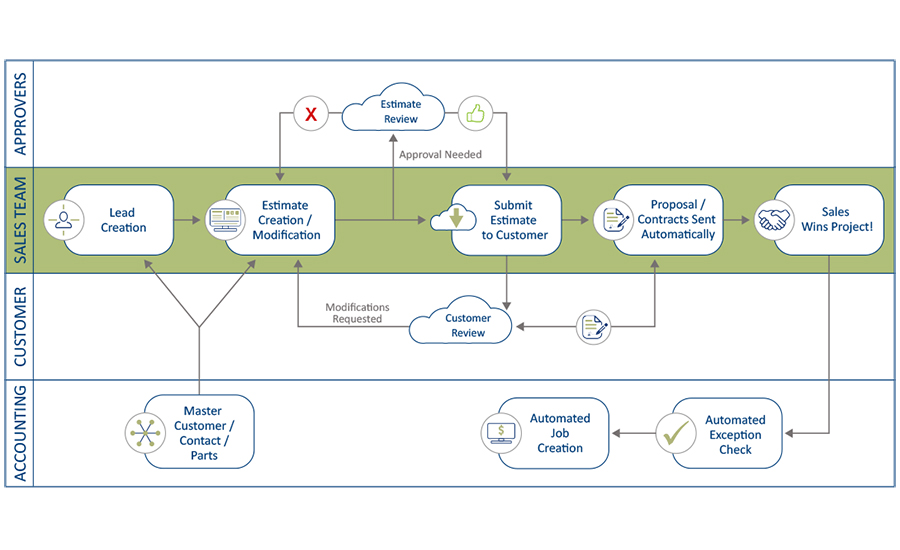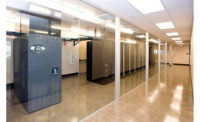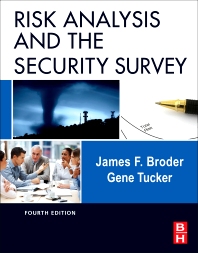The right operations software can make a big difference for a security dealer — saving time, money and providing a competitive edge.
SDM reached out to some of the leading providers of software for the security industry about their latest developments and the trends they are seeing in the market. Here’s what captured our attention and what should be of greatest interest to readers.
BOLD Group
The people at Colorado Springs, Colo.-based BOLD Group have been pursuing synergies since investment by a private equity firm brought Perennial Software and Bold Group under the same umbrella. Bold Group was known for its Manitou and Stages central station automation software and Perennial was known for its SedonaOffice suite of software for accounting and business management. Investors saw an opportunity to enhance both offerings by integrating them.
“We’re working on extremely robust integrations between alarm automation and accounting systems,” says Justin DeBaggis, director of financial management for Bold Group. A key goal is the ability to have services in the alarm automation software automatically update and sync with accounting, he explains.
The integrations will enable security dealer technical staff to, for example, see alarm activity and put accounts on test without having to go into a separate application. Dealers also will be able to automatically bill accounts for each supervisory signal sent after an established limit is exceeded. Traditionally, this would be a manual process.
Benefits also should include improved customer service, DeBaggis notes.
“If a customer calls in, I want to be able to open SedonaOffice and see a 360-degree view including what they owe, and I want to be able to put them on test and view signals,” he explains. “It’s cleaner for customer service and for the end user.”
Cornerstone Billing Solutions
Integration with other systems is also a key focus for Fox Lake, Ill.-based Cornerstone Billing Solutions — and that focus extends not just to creating new integrations but also to helping to ensure that integrations continue to function properly over time, says Scott McDougal, Cornerstone Billing president.
Cornerstones’ billing software has been integrated with central station automation systems, collection agencies, the post office and other partners, he says.
“Dealers really expect some monitoring of integrations so that they do actually work,” McDougal observes. “They expect us as a software provider with integrations to other companies to keep on top of ongoing integrations and if we get errors, to fix whatever may be wrong.”
Cornerstone gets alerts if an integration isn’t working properly and calls the dealer right away, typically guiding the dealer through how to address the problem, which sometimes involves human error, McDougal explains.
A typical error might involve a company that has its central station create accounts, explains Jody Schuhart, vice president for Cornerstone. The dealer then pulls the customer information from the central station but gets an error if the central station hasn’t actually built the customer record yet.
Cornerstone’s software is offered as a managed service, with dealers paying a monthly fee for the service. And with this mindset, the company is looking at new ways to help dealers generate some additional recurring monthly revenue (RMR) for themselves: Cornerstone is acting as a distribution channel to security dealers for a company that offers a data breach reporting service.
Companies of all kinds have various legal requirements to report certain types of data breaches — if, for example, a certain type of email is inadvertently sent to the wrong recipient. These reporting requirements are complex and vary from state to state, making compliance difficult, McDougal explains. Using a specialized service simplifies compliance and helps ensure that the process is handled correctly, he says.
Dealers can use the service themselves or sell it to their customers, thereby creating a new RMR stream.
DICE Corporation
Another software provider that is helping security dealers generate new revenue streams is Bay City, Mich.-based DICE Corporation.
DICE owns an internet service provider business and has begun to give security dealers the opportunity to sell internet and telecom services provided by that unit of the company, explains Cliff Dice, president and CEO of the company.
Dealers can generate additional RMR by selling the services, sometimes coupled with business applications such as a virtual PBX service that replaces a traditional local PBX business phone system.
“They can sell a virtual PBX with other options that are unique to the security industry,” Dice says.
This offering may generate other benefits for dealers as well, notes Avi Lupo, DICE executive vice president.
“We see dealers moving more into hosted access control and video,” Lupo says. But in offering such services, dealers may find that they are at the mercy of the internet provider, he notes.
By becoming the customer’s internet provider, dealers gain more control over the type of connection that a customer uses to reach the central station, helping to ensure that the connection provides sufficient bandwidth and service quality.
Hitachi America
Hitachi America wants to streamline the process of preparing video surveillance system proposals by moving the process online.
“What it does is it allows you to grab a physical site,” Eldor Reif, senior manager of IoT imaging and security solutions strategy planning for Hitachi America, explains about the company’s offering, 3DEZ.
Increase Selling Time With Sales Workflow Automation

Image Courtesy of WESUITE
Sales management software — like business software in general — is all about automating workflow. When processes are automated, security integrators can get more done.
Studies show that salespeople spend only about one-third of their time in customer-facing sales activities — in other words, actually selling. On a weekly basis, that amounts to 13.2 hours selling. That’s 53 hours of sales time that’s lost monthly. Instead, “sales time” is spent dealing with meetings, paperwork, reporting and other administrative tasks. Automated workflows can help wrestle those hours back by taking charge of redundant tasks, moving multi-step, complex processes speedily along, and helping to hold humans accountable for actions they must take along the way. Here’s what that looks like in a security sales organization.
Fewer and More Productive Meetings. When sales management software is used to share lead, customer and product data across an entire organization, many communications can be automated and simplified, while opportunities for miscommunication are diminished.
For example, mobile quoting tools can enable sales to close on the spot. An outside salesperson out on a sales call can complete the sale, and automatically share her notes and quoting with her inside partner back at the office, all in real time. The inside partner can be “in-the-know,” handling follow up, before the outside rep even leaves the site, and the outside rep can immediately move on to the next sales call knowing her partner has her back.
Automated workflows can also help a sales manager reduce the frequency or length of meetings with his staff. Software spontaneously and accurately shows in real-time each salesperson’s pipeline, enabling better coaching with respect to quota goals. It also automates commission calculations, keeping salespeople informed of their estimated earnings, reducing the number of questions, complaints — and yes, meetings. Automated approvals allow managers to review only those quotes that surpass specific thresholds and software makes him aware of those requests. Meetings can be dedicated to productive planning and strategizing, not tedious information gathering.
Simplified Paperwork. Of the many ways that sales management software can eliminate or simplify paperwork, proposal building and contract generation is the best example. It provides salespeople with pre-defined templates to handle different types of projects, automates complex quoting calculations, pre-populates fields throughout proposal documents with appropriate information and even facilitates e-signing of contracts by customers.
Less Busywork. Automated workflows end redundant data entry. Once data is in the system, sales management software makes sure it’s shared, and accessible, wherever it’s relevant. If parts are discontinued, added, or prices changed, automated workflows push this information into the quoting platform, so that salespeople are equipped with current and accurate data. These are just a few examples of how automation eliminates busywork and opportunity for human error.
“There’s no magic wand that will allow security sales professionals to cram more hours in the day, but automated workflows can help them make better use of the hours they’ve got, engaging in the customer-facing, revenue driving activities that matter most.” — Tracy Larson, President of WeSuite.
The software creates a three-dimensional model of a facility, thereby helping the dealer and the dealer’s client visualize the project. Once the dealer establishes what the customer has in place, the software can then be used to place cameras in the 3-D model.
The traditional process of preparing a proposal can take weeks to months but Hitachi expects to reduce that time using this approach. The company estimates that the proposal process consumes about 10 percent of the total end-to-end project timeline.
“If you can halve that, it’s a lot of money,” Reif says.
Micro Key Solutions
MKManaged, the cloud-based accounting and service software that Micro Key Solutions added 18 months ago, has really been taking off, observes Victoria Ferro, president of Micro Key.
“Our focus continues to be an all-in-one solution that works the way alarm companies work,” Ferro says, adding that “new customers typically go directly to the cloud.”
The newest offering from Micro Key is MKSynergy, which is an integration with partner central stations that supports Micro Key, Stages and MAC automation platforms. As Ferro explains, the offering lets dealers create, view, modify and delete their subscribers’ monitoring-related information in one simplified interface. At press time in April, the company was almost ready to launch the offering to a select group of beta testers.
According to Ferro, the new offering will be a highly complete integration and will help avoid situations where an account is live at a third-party central station but the dealer has no billing record for the account.
“When a dealer connects to see monitoring-related information, we’re actually connecting to the monitoring station’s database,” she says.
System Surveyor
Camera Advisor is the newest offering from System Surveyor, an Austin, Texas-based provider of cloud-based system design software — also known as System Surveyor — which can be used to design intrusion detection, access control, video surveillance and other types of systems. Camera Advisor works in combination with the System Surveyor software to let dealers visually show what the video images of a coverage area will look like at various resolution levels.
“Integrators are experiencing, for the first time, interfacing with the customer in a completely different way,” says Maureen Carlson, vice president of sales and marketing for System Surveyor. “Within minutes or seconds, they can design [the system] with the customer looking.”
System Surveyor uses the term “digital system design” to describe the System Surveyor offering, which lets users import floor plans, photos of the customer site and Google Earth images to help expedite the process of preparing a proposal for a site.
Adding Camera Advisor further enhances design capabilities.
“While you’re walking the site with a customer, you can visually show them [the video image] and let the customer determine the level of resolution needed,” Carlson notes.
WeSuite
“We’re very focused on helping salespeople become more mobile and achieve more in less time,” says Tracy Larson, president of White Plains, N.Y.-based software provider WeSuite.
The latest additions to WeSuite’s software lineup are Site Survey and QuoteAnywhere.
Larson uses the term “quote-to-close” to describe QuoteAnywhere, which is web-based mobile sales quote software that lets sales teams work collaboratively and remotely with prospects to create sales estimates.
“It lets salespeople sit in front of a customer and create a quote,” she notes. The customer can participate in the quote creation process.
Quotes include labor, chargeable items and recurring services, as well as real-time access to a parts database. Proposal and contract documents are automatically generated and can be signed on the spot using integrated electronic signing services.
Site Survey is a web-based survey tool that is fully integrated with QuoteAnywhere and with WeSuite’s WeEstimate software, Larson explains. Users can upload a photo, jpeg, pdf or image file to a “digital canvas” or use built-in sketch tools to depict a project area. They also can search a live integrated parts database, drag and drop parts on the canvas at proper locations, add notes as needed and produce a summary budget.
“When you use technology to sell technology, I think it’s a game changer,” Larson says.
Summary
From system design to the back office, software developers are keeping the unique needs of security dealers and integrators top of mind as they create new offerings. And there seems to be no end to the creative thinking that developers are bringing to the market.
More Online
For more information about business and operations software for security dealers visit SDM’s website, where you will find the following articles:
“Top Integrator Employs Software That Supports the Way Their Security Integration Business Operates”
www.SDMmag.com/software-that-supports-the-way-security-integration-business-operates
“Security Software: The Secret Sauce”
www.SDMmag.com/security-software-the-secret-sauce
“5 Trends in Operational Software You Can’t Afford to Ignore”











